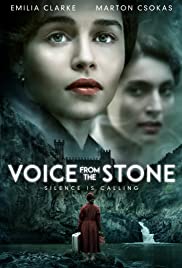
VOICE FROM THE STONE
Italy/US, 2017, 94 minutes, Colour.
Emilia Clarke, Marton Csokas, Caterina Murino, Remo Girone, Lisa Gastoni, Edward George Dring.
Directed by Eric Dennis Howell.
Voice from the Stone is based on an Italian novel, with a 1950s setting. It could be classified as a ghost story with some mild touches of horror.
At the opening of the film, a woman is dying and asks her son to call her back to him. From the time of his mother’s death, the boy does not speak. His father is concerned and has been hiring governesses. The latest governess is Verena, played by Emilia Clarke (Me Before You, Game of Thrones). She is confident, rationalist in her approach, especially when it emerges that the boy listens to the walls, holes in the walls, and he is voices. His concerned father, Martin Csokas, is a sculptor.
This is a rather slow-burning film, the governess gradually settling into the house, assisted in her room by the dead wife’s dresser (who later is revealed to be a ghost). The boy is wilful but gradually the governess begins to pretend to listen to the wall, then hearing sounds, voices – is she possessed by the voices, can she do her work, can she connect with the boy? She rushes away but collapses and is returned to the house.
The film is able to have to endings – the sinister ending where she is buried alive, lying next to the dead wife, but this turns out to be a nightmare. Recovering, she connects with the boy who speaks to her, plays the piano with her – and she is the reincarnation of his mother.
The director, Eric Dennis Howell, had a career working in stunts and making short films.
1. The title, the literal manifestations, for Jakob, for Verena?
2. The 1950 setting, Italy, the beauty of the Italian countryside, the woods, pools? The ancient buildings? Exteriors and interiors? Atmosphere? The musical score, the final song?
3. The introduction to Verena, who work with children, helping them, moving on? Parents and gratitude? Coming to the new house? The overwhelming atmosphere? Her age, experience, earnestness? Handling children?
4. The introduction to the house, the servants with the touch of the sinister? The father, the interview, his warning about past governesses, her confidence? The room, settling in? The task with Jakob? His mother’s death and his not speaking?
5. Jakob, the opening sequence with his mother dying, her asking him to call her back? Not speaking since her death? The daily life and routines, his relationship with his father? Surly, disobedient? At the table? Wandering in the woods? The Cliff, the cave, his floating in the water?
6. Verena, the black clothes, the room, encountering the dresser, combing her hair, the advice, the memories, the story of the dead wife, pianist, her to bring? Her death?
7. The father, the sculptor, taciturn, concerned about his son? The discussions with the Verena? The beginning of the attraction, his imagination, her imagination, sexual encounters? Her posing for the wife’s sculpture?
8. Verena and her attempts to work with Jakob? Activities, in the woods, the top of the cliff, in the water? The piano? His disappearances, the shooting of the rabbit? And eating at the meal?
9. The issue of his listening to the voices on the wall? Her scepticism? Explanations to his father? Who beginning to listen, the variety of sounds, Jakob and the different places where he listened? The hole in the wall? Verena and her gradually hearing sounds, voices, being transformed?
10. Her dependence on Jakob, his dependence on her? To save him in the water? The voices, her decision to leave, the escape, collapse?
11. The screenplay and the double ending: her having the nightmare being buried alive, in the tomb with Jakob’s mother? Her waking, staying, part of the household, the servants more friendly, but her discovery that the dresser was a ghost?
12. Verena, the different personality, playing the piano with Jakob – and his mother being reincarnated in Verena?